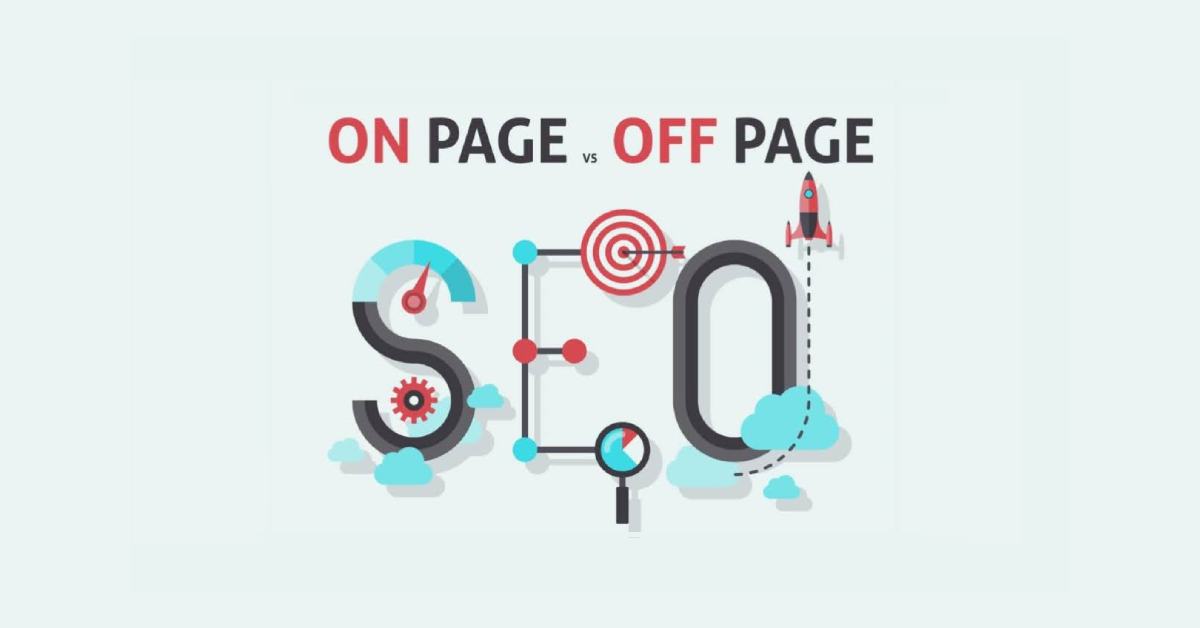January 9, 2024
Understanding the Difference between On-Page SEO vs Off-Page SEO

In the fast-paced digital world, Search Engine Optimisation (SEO) is the key to unlocking your website’s true potential and reaching your target audience effectively. there are two important pillars, they are On-Page SEO and Off-Page SEO. These are like the secret ingredients that help will help you to improve your website’s visibility and rank high on the search engine.
In this blog, we will delve deep into the world of SEO, shedding light on what makes On-Page SEO and Off-Page SEO apart, their significance, the tools used, and how they work. What is the difference between On-Page SEO and Off-page SEO?
What is the difference between On-Page SEO and Off-page SEO?
On-Page SEO and Off-Page SEO are two fundamental aspects of search engine optimisation, each with its focus and strategies. Here’s a clear breakdown of the key differences.
On-Page SEO
1. Location (On Your Website):
On-page SEO is all about improving your website from the inside. It’s like tidying up your house to make it more attractive and comfortable for your guests. You do this by making changes directly on your website, and these changes help both search engines and people who visit your site.
2. Content and Keywords:
This part of On-Page SEO focuses on the words and information on your website. It’s like having a conversation with your website visitors. To do this well, you need to:
- Use Relevant Keywords: Think of keywords as the words people type into search engines when looking for something. You should use these words naturally in your content so that your website shows up when someone searches for them.
- Create High-Quality Content: Your content, whether it’s articles, product descriptions, or other information, needs to be helpful, interesting, and well-written. This makes people stay on your site longer.
- Optimise Meta Tags, Headings, and Image Alt Tags: These are like labels that tell search engines and visitors what your content is about.
3. User Experience:
This aspect of On-Page SEO is about making sure your website is user-friendly. Think of it as creating a pleasant and easy-to-navigate store:
- Page Loading Speed: Your website should load quickly so visitors don’t get frustrated waiting for it to appear, similar to how you wouldn’t want to wait too long in a store.
- Mobile-Friendliness: Your website should work well on mobile phones and tablets, just like a store should be accessible to all customers, no matter their size or shape.
- Ease of Navigation: Your website should be easy to move around, like having clear paths in a store so customers can find what they want without getting lost.
4. Control:
The best part about On-Page SEO is that you’re in charge. It’s like being the boss of your shop. You can make all the changes and improvements you want directly on your website because everything is under your control.
Off-Page SEO
1. Location (Outside of Your Website):
Off-page SEO is like building your reputation outside of your home. It’s about making a name for yourself on the internet, but the action happens away from your website.
2. Backlinks (Links from Other Websites):
A significant part of Off-Page SEO is getting other websites to link to your content. These are called backlinks, and they work like recommendations or references. In the online world, these backlinks are similar to recommendations. They show that other websites trust your content and think it’s relevant. Search engines also see backlinks as a vote of confidence, which can improve your website’s ranking in search results.
3. Social Signals (Social Media Impact):
Off-Page SEO is not just about websites; it also considers your presence on social media. Social signals include actions like sharing your content, liking it, and leaving comments. These activities on platforms like Facebook, Twitter, or Instagram help boost your online presence. It’s like when people talk about your business on social media, and others start paying attention.
4. Reputation and Trust:
Building a good reputation and trust is at the heart of Off-Page SEO. It’s about becoming known as a reliable and knowledgeable source in your industry or niche. This is like gaining a reputation as a go-to expert in your field.
5. Less Control:
Unlike On-Page SEO, where you have direct control over your website’s content and structure, Off-Page SEO is more influenced by others. You can’t force websites to link to you or make people share your content. It depends on their willingness and their evaluation of your website’s quality and relevance.
Commonly Used On-page and Off-Page SEO Tools
In the world of SEO, there are various tools available to help digital marketers optimise their websites for search engines and enhance their online presence. For On-Page SEO, tools like Yoast SEO, SEMrush, and Moz Pro are popular choices. These tools assist with keyword analysis, content optimisation, site audits, and overall on-page performance. Google Search Console is essential for gaining insights into how search engines perceive your website. Ahrefs and Screaming Frog SEO Spider are also valuable for on-page SEO tasks. Additionally, writing aids like Grammarly and CopyScape ensure content quality and originality.
On the other hand, Off-Page SEO relies on tools like Ahrefs and Majestic SEO to analyse and manage backlinks. BuzzSumo helps identify shareable content and potential link-building opportunities, while tools like Hootsuite, Google Alerts, and Moz Link Explorer are vital for tracking social signals and brand mentions. These tools are invaluable for webmasters and digital marketers looking to improve their website’s SEO and online reputation.
These are just a few examples of the many tools available for On-Page and Off-Page SEO. Depending on your specific needs and goals, you may find some tools more useful than others. It’s essential to choose the tools that align with your SEO strategy and help you achieve your objectives.
Conclusion
To sum up, On-Page SEO is like making your website itself better by using the right words, creating good content, and ensuring it’s easy to use. It’s all within your control.
On the other hand, Off-Page SEO is about getting other websites to say good things about your website. It’s like earning trust and credibility in the online world. You do this by getting other websites to link to your content, indicating to search engines that your site is reliable and relevant. While you can’t control this directly, it’s important for building your website’s reputation and trustworthiness.
Both On-Page and Off-Page SEO are necessary to help your website rank well in search engines and be successful on the internet.




